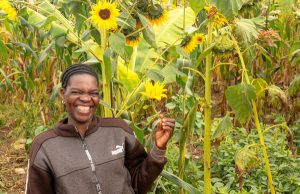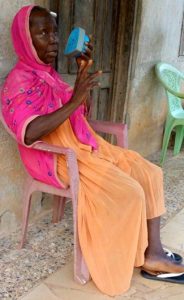Landesa: Empowering Women Through Land Rights
By Ellen Weiss, Transformation Partnerships Writer
Imagine a world where women have equal footing. A world where the power offered by secure rights to land is shared by women and men. A world where that power is used to strengthen the livelihoods of women, their families, and their communities.
This vision propels Landesa’s work with local, grassroots organizations in more than 50 countries.
Founded in 1981, Landesa is a non-governmental organization that partners with governments and civil society  to extend and strengthen land rights for women experiencing poverty. Stronger rights to land have the power to reduce poverty and conflict, increase economic activity, empower women, strengthen food security, and improve environmental stewardship.
to extend and strengthen land rights for women experiencing poverty. Stronger rights to land have the power to reduce poverty and conflict, increase economic activity, empower women, strengthen food security, and improve environmental stewardship.
Landesa is one of Together Women Rise’s Transformation Partners. Our support of $200,000 over two years is furthering Landesa’s critical work, including Stand for Her Land — a global advocacy campaign spearheaded by Landesa to secure women’s rights to the homes they live in and the resources they care for and to engage men on the journey to equality.
“Together Women Rise is proud to be partnering with Landesa, a trailblazing organization that is fighting to change the systems that hold women back from achieving land rights and gender justice,” says Beverley Francis-Gibson, Rise’s CEO. “Landesa has a proven track record in securing property rights for women – having worked in over 50 countries where women still encounter persistent barriers to their land rights. Land rights are part of women’s human rights and a key component of gender equality.”
Worldwide, women are the primary producers of food, holders of knowledge of traditional ecology and medicine, and careful and fierce stewards of complex ecosystems. Without land to build or maintain a home, to farm or leverage for economic gain, to inherit from a relative, and to use as her own, women’s security, prosperity and dignity remain compromised.
Land rights for women mean more equal power dynamics within the home and community, and ability to realize economic opportunity and legal rights. It also enables women to claim agency and leadership within households, communities, and societies.
The following are just a few of Landesa’s many success stories:
 In Tanzania: Imelda’s Story
In Tanzania: Imelda’s Story
Imelda Kalinga is a widow in Mufindi District, Tanzania. Following the death of her husband, she couldn’t call her farm her own. She had limited options to register land under her name, which put her at a risk of losing the land she farmed with her family for decades due to harassment from her in-laws.
To help widows like Imelda, Landesa launched an innovative, gender-responsive land use planning process. Now she has her Customary Certificate of Occupancy – one of over 4,000 Certificates delivered to smallholder farmers in eastern Tanzania (45% of them issued to women). The participatory program increased the awareness of women like Imelda regarding their land rights, helping to accelerate gender equality and women’s empowerment.
In Liberia: Jebbeh’s Story
Another inspiring example is Jebbeh Debor, a 65-year-old widow from Grand Cape Mount County in Liberia. After years of being denied the farmland she had inherited from her father, Jebbeh participated in a USAID and Landesa program that distributed Amplio Talking Books, simple hand-held audio players with messages in local languages that raise awareness of land rights. Through this program, Jebbeh gained the knowledge and confidence to assert her rights, and her brothers finally acknowledged her inheritance. According to Jebbeh, it is the first time the elders in the family have given land rights and ownership to women. She is now successfully cultivating cocoa on her land. Jebbeh’s story is a testament to the power of land ownership as a critical driver of economic development and equality, especially for women and youth in Liberia and beyond.
TO LEARN MORE ABOUT LANDESA, ITS WORK & ITS IMPACT:
- Watch Together Women Rise’s May webinar and interview with Beth Roberts, Director of Women’s Land Rights for Landesa.
- Watch these short, 2.5 minute videos:
- Women’s Land Rights Infographic
- Visit Landesa’s website at landesa.org.
